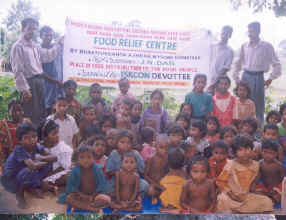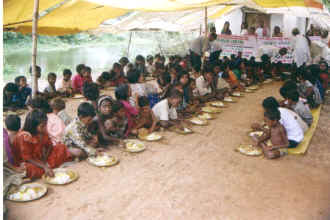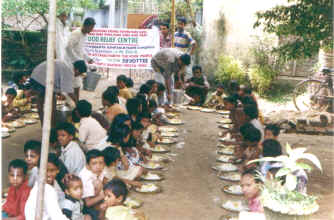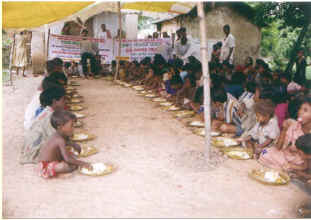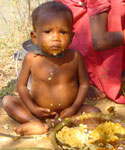
We would like to thank all of the donors who have participated in the annadana seva organised by the Ashram. On this page you can see some of the photos of two of our recent food relief programs held last month in Orissa. Recently, Orissa was again affected by floods and as a result there was a great need for these relief activities to help feed the poor and displaced persons there.
We have been focusing our food relief efforts mostly in the state of Orissa due to the great level of poverty in that region compared to here. Our ashram has a small branch in the city of Bhadrak, Orissa, and it is through that center that we are able to carry out these relief works.
At present we are conducting food distribution twice in the month, each time feeding around 1,000 to 1,500 people, but we are hoping to increase this to four times a month soon. All of the preparation and distribution is done by congregational devotees of our ashram as a seva. As such, there are absolutely no expenses for us other than for feeding the poor; no salaries, no office rent, etc. This ensures that 100% of the money is used for the purpose it is intended.
The procedure given by our guru, Sri Bhaktivedanta Swami Prabhupada, is that we should first prepare the food to be offered to God in our temple or ashram, and then distribute the prasadam to the needy. This ensures that what we give to the poor is the highest quality food – what we would consider fit for offering as naivedyam to the Lord. Thus what we give them is not an ordinary meal, but sanctified food which has been accepted by the Lord.
In the Vedas we find the following statement:
ahara-shudhau sattva shudhi
sattva shuddhau dhruva-smritih
smriti-lambhe sarva granthinam vipramokshah
“By eating sanctified foods, one’s existence becomes purified. By the purification of one’s existence finer tissues in the memory become sanctified. When the finer tissues of remembrance become sanctified, all the knots within become untied.”
Thus the food that we give to the needy not only satisfies their hunger materially, but it begins the process of inner purification which ultimately leads one to “vipramoksha”, either in this life or the next.
Sri Krishna describes proper food in the Gita as follows:
ayuh-sattva-balarogya-
sukha-priti-vivardhanah
rasyah snigdhah sthira hridya
aharah sattvika-priyah
“Foods dear to those in the mode of goodness increase the duration of life, purify one’s existence and give strength, health, happiness and satisfaction. Such foods are juicy, fatty, wholesome, and pleasing to the heart.”
We are always careful that only the best foods, sattvika-ahara, are prepared for use in our food relief program. To us it is not only a service to man, but a service to God, and a personal service to our Guru, Sri Bhaktivedanta Swami Prabhupada.
In the Bhagavad Gita Lord Krishna states:
annad bhavanti bhutani
“All living entities subsist on food grains.”
This is the beginning of the spiritual instructions in the Upanishads, to understand the anna-maya level of existence – that everyone exists and is sustained through food. Only after realizing this understanding is it possible to develop the higher understandings of prana-maya (existence as life force), mano-maya (existence as the mind), vijnana-maya (existence as the intelligence), and ananda-maya (existence as the soul).
How can it be possible to realize the self while one is not properly fed? It is not possible for common men to meditate on God while they have empty stomachs. Some things we take for granted, one of which is our freedom to follow spiritual life and religious practices. For us it is easy to take to these things, so much so we often forget the great blessing we have. We should always remember that there are many others who don’t have this great opportunity to worship the Lord and take to spiritual practices simply because they don’t have sufficient food to eat and maintain their families. Certainly it is a great loss for anyone to miss out on the spiritual aspects of life. We should especially feel sorry for the children who are brought up in such environments where they are not able to develop to their full potential, both materially and spiritually. Some may blame such circumstances on karmas, but the devotees of the Lord should be full of karuna (compassion) and always try to help their fellow brothers and sisters.
It is true that everything is due to our karmas, but this should not encourage devotees to become hardened and unkind to others in the world. Krishna says in the Bhagavad Gita:
sarva-bhuta-hite ratah
“One should work for the welfare of all living entities.”
Your assistance in these programs is humbly requested. You can help make a difference in the lives of countless children, who would otherwise be facing severe hardships and difficulty. Your personal involvement in this most important seva is necessary to enable us to carry on these activities.
We are not a large institution; we are just a small ashram with some dedicated congregational members wanting to render whatever seva is within our capacity. It is just like the squirrel who helped Lord Ramachandra build His bridge to Sri Lanka by carrying a few pebbles. Through the use of the internet we are able to find people who want to help the poor, but who are not able to personally cook and distribute for whatever reason. With their donations and our dedicated congregation of bhaktas in India we are able to assist them in their desire to help others by being their extended hands distributing food in the villages.
At present there are around two dozen regular monthly donors for our food relief program. This is enough to cover our present twice-monthly distribution. As more donors come forward, we hope to increase our food distribution to four times a month, and then gradually to a daily program. Whether this will happen depends on the will of Sri Hari.
I would like to briefly share with you some of the details of our most recent food distribution which was held in the village of Randiya in Orissa (photos accompany this article). We started the distribution around 11 am, and went on till the evening, when there was no longer enough light to continue. This particular village in Orissa is very poor, and the people there belong to the ‘Adivaasi’ community (tribals). The staple diet of these people is plain rice and salt. They never eat such things as vegetables, dhal, etc. In fact when we served them dhal, subji and chutney these people said they had never eaten these things in their life. They told us we were giving them “king’s food” and that they had never tasted such a delicious meal. On that day over 1,000 people were fed, mostly young children (some of whom you can see in the photos). Since the distribution went on from late morning till night, many of these children returned for a second time in the evening.
For that one program we cooked a total of 250 kg of rice (550 pounds), 60 kg of dhal (132 pounds), 100 kg of vegetables (220 pounds), and a large amount of mango chutney.
You would be amazed to see how much rice these small children were eating. Their leaf plates were piled so high that there was no place for us to serve the dhal, vegetables and chutney. After eating everything, they again filled their plates full to take home for other family members who had gone to the fields to work and were unable to attend.
When we finished in the evening, not a single grain of rice was left over. If we had cooked twice this amount of food they would still have finished everything. Afterwards, the villagers helped us by assisting in cleaning the area and washing the pots. Everyone was eagerly asking, “When will you be doing this again in our village?” We promised them that we would return next month.
In the Mahabharata, we find the section known as “Yaksha-prashna”, in which Yudhishthira Maharaja is questioned by a Yaksha on various topics of dharma. One such question asked was, “What is the most important goal of man?”, to which Yudhishthira replied “Charity is the most important goal of man.” In the Gita Lord Krishna states that this charity is actually a yajna, or sacrificial offering to the Lord, known as dravya-yajna. This dravya-yajna is a sacrifice of ingredients and possessions for the purpose of the Lord. Such performance of sacrifice is certainly very pleasing to Lord Krishna, and one who engages in it will quickly advance in spiritual life.
In the absolute sense everyone is spiritually poor in this world, so everyone is in need of Sri Krishna’s “prasadam”, or His divine mercy. But according to their level of consciousness and their prarabda karmas we approach them with the most appealing form of the Lord. To the poor and hungry, the naivedya prasadam is the “ananda-murti” form of the Lord. For others, the “bhagavata katha” is the “galitam phalam”, the ripened fruit full of “amrita” (divine nectar):
nigama-kalpa-taror galitam phalam
shuka-mukhad amrita-drava-samyutam
pibata bhagavatam rasam alayam
muhur aho rasika bhuvi bhavukah
“O expert and thoughtful men, relish Srimad-Bhagavatam, the mature fruit of the desire tree of Vedic literatures. It emanated from the lips of Sri Shuka Muni. Therefore this fruit has become even more tasteful, although its nectarean juice was already relishable for all, including liberated souls.”








